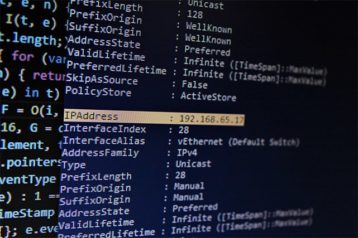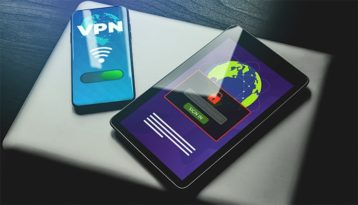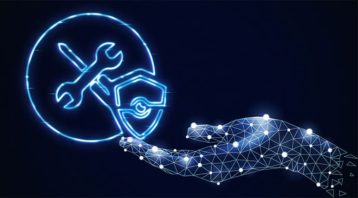The primary way hackers use your IP address is to hack the ports that media sharing services use to operate on your computer. Fundamentally, you should think of ports as openings that services use for communication. If we’re talking about TCP/UDP, the total allocated ports reach around 65,500.
Using techniques like banner grabbing, hackers can exploit a port and the service using that port. With a ton of information at hand, they can then run exploits on the service in question. Even a mediocre hacker knows how to use the port scan exploit via the Nmap software on a given local computer.

To avoid such threats, you can always change your IP address. There are many ways to do this; just understand that whenever you have an internet connection on any given device, you also have a valid IP address.
If you’ve been following security news for any amount of time, you may find plenty of online outlets claiming that if someone has your IP address, that person can see your identity. Well, that isn’t exactly true.
Many security researchers have repeatedly debunked this myth, stating that if hackers could harm people by just knowing their IP address, the internet would be even more unsafe than it is now. No one’s personal and private information would be safe from hackers.
Yes, by knowing your IP address, hackers can perform certain malicious tasks. But it’s also true that you aren’t a sitting duck if someone knows your IP address.

Hackers love to work within the TCP/IP world, which is essentially an interface between programs and networks via an electronic channel system known as ports. Ports have unique IDs hackers can use to identify their function.
It also helps to think of ports as pipelines. Data can flow into and out of these pipelines via network protocol software and a given application.
Since each port has its own unique ID address, computer systems rely on these to determine which incoming data belongs to which application. Modern systems have several applications running simultaneously, so the built-in network software must have a way to keep things organized. More specifically, your computer system uses ports to know that your email application must receive all the incoming emails and not some other application.
But ports aren’t inherently unsafe. Your computer system needs to open one every time you launch an application, and that application needs to access the internet. If a hacker knows the IP address, they can potentially access your network. Depending on their available resources, they can also manipulate the applications running on your computer system.
Modern programs work in a self-contained unit because they don’t have connections to other programs. In turn, this means that even if a hacker compromises one program through a given port by exploiting your IP address, they would not be able to affect the rest of the system. The hacker would only have access to the program and anything the program has access to.
Table of Contents
What About Government IP Address Hacking?

So far, we’ve referred to hacking groups and individual hackers, but don’t forget the biggest player in the hacking industry: The government. It is the only player in town with the finances and the infrastructure to carry out large-scale, small-scale and medium-scale IP address hacks as many times as required.
When it comes to the different IP address exploits hackers use to gain access to targets’ computers, C2 attacks make the top of the list. Along with that, there are other IP addresses exploits, such as:
- Spyware
- Keylogger
- Downloader
- Backdoor
- Trojan
- RAT
- Capture stored data exploits
- Exploit vulnerability
- Password dumper exploits
Note:
You should understand that most government IP address attacks take advantage of one simple exploit to hack into systems and steal data. And it mostly involves the government or a hacker group going after a single vulnerable user (who is connected to the internet) on a machine inside a corporation, a research university or even a defense contractor through a technique called phishing.When successful, an email phishing attack provides the hacker group or a government agency a backdoor into the target computer or network. Since many users worldwide have moved to work remotely in the last few years, especially since the COVID-19 pandemic began in 2020, the threat of successful phishing attacks has only increased.
In any case, once the malware is on the system, it can do pretty much everything hackers or government agencies want it to. It can contact the hacker’s Command and Control server or C2, which is a server network that essentially serves as their headquarters.
So, what does a C2 server do? It essentially commands the backdoor on the target machine. For example, C2 servers can execute a command that launches a file system function and then exports the data. Most of the time (and this is especially true in the case of foreign governments), hackers try to search for password hashes files.
Then, they can do a password dumping maneuver and perform another reverse lookup to hack accounts remotely. A hacker has to be very skillful to perform such attacks without government backing.
The key point remains the same, though, end-users can prevent most of these attacks by practicing good internet hygiene.
Let’s take a look at some of the things you can do to prevent IP address exploits and hacks:
How To Prevent IP Address Hacks
You should always take preventative steps to mitigate IP address hacks because every activity that gets executed through your IP address is your responsibility. Cybercriminals know this and routinely try to take advantage of that fact. Once they hack your system, they’re free to use your computer or mobile device to do any illegal and/or unethical activity.
To to be able to guard against these threats, here are the steps you need to take:
1. Create Unique and Strong Passwords for All Sensitive Accounts

If there is one free and foolproof method of keeping unwanted access away from anything you value on your computer, that is a strong password. Never have default passwords for any of your devices. As a general rule, you should change the default password on the day you buy and/or install any given device.
Replicate the same system for all of your online accounts, not just your devices.
This is important:
Create a long, unique password using a combination of words, digits and special characters, not just words from the dictionary.You can do it on your own or use a password manager like LastPass, 1Password or BitWarden.
2. Use a VPN Service To Secure Your IP Address

Virtual private network (or VPN) services can protect people against malware and IP address threats by not only hiding their real IP address but also getting a new one in any location you desire.
VPNs make your internet safe without you having to jump too many hoops. You don’t even have to spend money on them as the market has plenty of free VPN services as well.
In turn, the VPN blocks all snooping and spying from cybercriminals who want to inject malware into your machine. As a result, devices that use virtual private network services become harder for someone to exploit or hack.
3. App Restriction for Better IP Address Protection
IP address hacking relies on the apps you have installed on your system. Hence, you should limit the apps you have on your system, especially when it comes to communication platforms.
Pro Tip:
Change their status from public to private as well. Don’t answer calls from unknown numbers since a hacker might call you, connect, see your location and get your device specifications.4. Beware of Malicious Content and Phishing Attempts
Be constantly aware of the potential phishing attacks that you may fall into. Phishing emails are a very common way for hackers to get malware and tracking scripts on your device. Don’t open anonymous emails or click on links you don’t trust or have no information about.
5. Use Antivirus Software

To further protect yourself from hacks that make use of IP addresses, use an antivirus program to safeguard your computer from malware, ransomware and other cyberattack vectors. Antivirus software gives you that extra layer of protection you need to stop websites and apps from gaining access to your device.
Can IP Addresses Reveal Identity?
Yes, an IP address could reveal your name and identity in certain circumstances. For example, if you’re under investigation by law enforcement, the government could get a court warrant to compel your internet service provider to share the name and account associated with a certain IP address or computer/network.
Note:
Mostly, though, your IP address shows your general location (the perimeter around your house, work, school or wherever you’re connected to the internet).Can a Hacker Track You Down if They Know Your IP Address?
Yes, but no one can see your exact location by knowing your IP addresses. Hackers and government organizations can see your city and, at the most, your general area. After that, they’ll need to contact your internet service provider to get your house address or another location that’s tied to your identity.
What Does It Mean if a Hacker Were To Use Your IP Address?
It means they’re using your computer to carry out malicious activities.
What Does It Mean When an IP Address Is Compromised?
When your IP address is compromised, it means hackers have gained access to your system.
How Secure Is an IP Address?
On their own, IP addresses aren’t very secure. Fortunately, you can secure your IP addresses by using a VPN service and a firewall with the correct settings.

